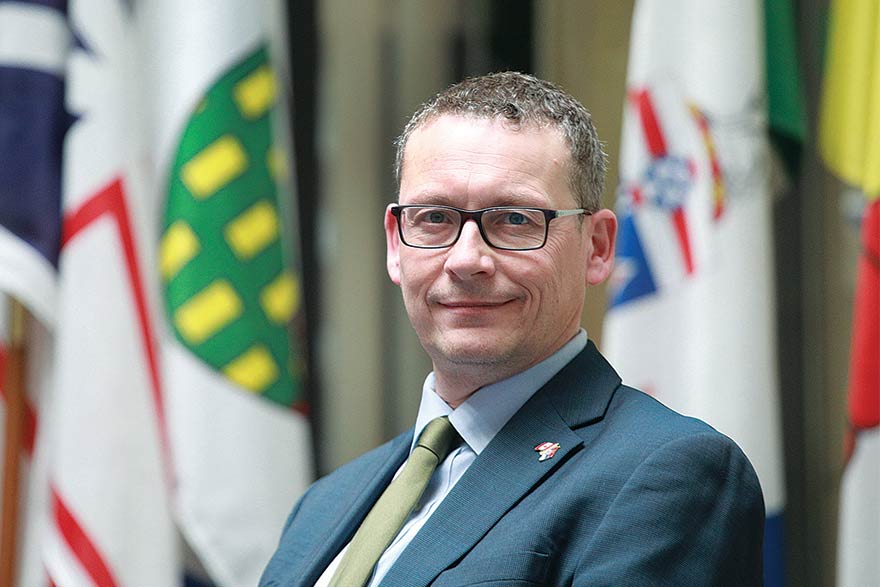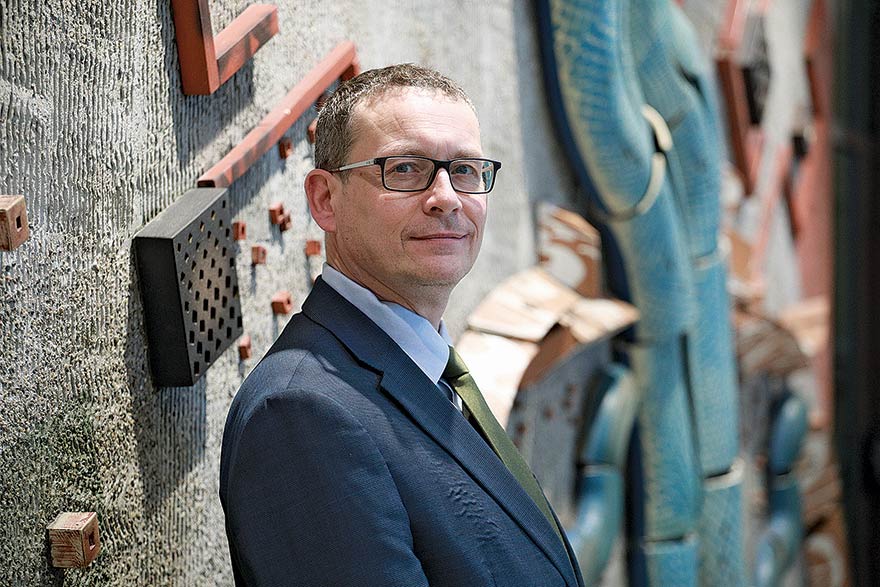We welcome the intention of the Serbian Ministry of Mining and Energy to further develop the mining regime and adjust it to the needs of the most important stakeholders: citizens of Serbia and the mining industry. Canada is committed to support that process and we will continue to discuss details of that cooperation with the Ministry.
Canadian companies are responsible for some of the major successful exploration projects that are currently developed in Serbia, representing an important cornerstone in Serbia’s decision to further develop its capacities in the mining sector. We spoke with H.E. Giles Norman (Designate), Ambassador of Canada to Serbia, about possibilities for transfers of knowledge and best practices in sustainable mining.
In 2013, previous Canadian ambassador to Serbia Roman Vaschuk expressed surprise that many in Serbia “neglect the importance of the mining potential for the development of the entire Serbian economy”. How have things changed in the meantime; and how much has Canada contributed to this change?
Mining has a long tradition in Serbia and it is my understanding that local communities are well aware of its importance, considering that several regions in this country, especially in Eastern Serbia, are economically dependent on mining. Serbia plans to strategically develop the mining industry’s share of GDP from the current 1.6% to 4%, and to do so largely thanks to excellent mineral deposits, which are recognised by international mining investors, including those from Canada. That said, I would say that Serbia is heading in the right direction in leveraging from its good geographic position and mineral deposits richness, and that the government has recognised the opportunity to develop the mining industry to its full potential.
Canadian companies discovered Serbia’s mining potential almost 20 years ago and are responsible for some of the country’s major successful exploration projects, including the development of the globally famous copper-gold deposit Čukaru Peki in Bor. We are also proud that Canadian mining investors, who have a proven track record in developing sustainable operating mines in the region, are also developing projects in Serbia, and we look forward to the further progress of these projects.
Several years ago, SNC Lavalin led the project of the new smelter construction in RTB Bor, which contributed to reducing air pollution in that city. Our companies have developed partnerships with some of the biggest mining investors in Serbia on exciting and innovative projects that are focused on critical minerals, such as lithium.
My impression so far is that Canadian investors enjoy a good reputation in Serbia, as they were one of the first foreign investor groups to expand to the Serbian market, transferring their responsible business conduct standards and knowhow in exploration, which is a very important stage in the life cycle of a mining project.
The Mining Association of Canada’s Towards Sustainable Mining (TSM) standard is a globally recognised sustainability programme. We hope to work with the Serbian mining authorities on the adoption of this standard in this country as well
Sustainable mining is becoming more important every day. How do you deal with these issues at home, and what would be the key lessons you would like to share with the Serbia public?
Mining is often perceived as a dirty, polluting industry, given that a traditional view of the typical mine would be an open pit with an enormous environmental impact on surrounding territories. Major stakeholders in mining: local communities, the private sector and governments, long ago recognised that, while mining remains critical for our everyday lives, its direct and indirect impact on environmental and social well-being must not exceed its benefits. This resulted in the development of strict national and international environmental, health&safety and social standards in mining, innovative technologies and an increase in strategic and inclusive project development communication, which led to what we today call ‘sustainable mining’.
Canada is recognised globally for its leadership in developing sustainable mining standards, which our companies need to respect regardless of whether their projects are in Canada or abroad. The Mining Association of Canada’s Towards Sustainable Mining (TSM) standard is a globally recognised sustainability programme that supports mining companies in managing key environmental and social risks. TSM was the first mining sustainability standard in the world to require site-level assessments and is mandatory for all companies that are members of implementing associations. Through TSM, eight critical aspects of social and environmental performance are evaluated, independently validated, and publicly reported against 30 distinct performance indicators.

Increasingly, other mining associations, governments, investors and manufacturers are looking to TSM as the global best practice in sustainable and responsible mining. In recent years, mining associations in Spain, Finland, Norway, Botswana, Argentina, Brazil and the Philippines have adopted the programme. We hope to work with Serbian mining authorities on the adoption of this standard in this country as well.
Sustainable mining is increasingly related to digital and innovative solutions. Serbia just embarked on the e-mining road. What is the Canadian experience in this area?
The transparency, predictability and efficiency of the permitting process are crucial for the successful realisation of mine development, given the reality of the mining project life-cycle that can span over a 30-year period.
After adopting the new Law on Mining in 2015, which relies on the best international practices from countries like Canada or Australia, Serbia was ranked very high in the international mining community for its regulatory framework. We welcome the intention of the Serbian Ministry of Mining and Energy to further develop its mining regime and adjust it to the needs of the most important stakeholders: citizens of Serbia and the mining industry. Canada is committed to support that process and we will continue to discuss details of that cooperation with the Ministry.
Trade relations between Canada and Serbia are growing and in 2020 we witnessed the increase of bilateral trade by 20%, despite COVID-19, with the total value surpassing CAD100 million for the first time in 10 years
Minister Mihajlović was very successful in introducing an epermitting system to the construction sector and has received praise for that from the international community, including the World Bank. Canada has vast experience in introducing e-permitting in mining, as a majority of our mining jurisdictions are already using it. We will gladly share that expertise with Serbia, in the hope of introducing the system soon, to the benefit of all mining stakeholders.
How many Canadian companies operate in Serbia today and on which issues do they seek your support?
The Canadian business community in Serbia gathers companies that are active in the following sectors: food&beverage, automotive, ICT, real estate, agriculture, mining and others. Our biggest investors in Serbia are Molson&Coors (Apatinska Brewery) and Magna International, while five companies are developing mineral resources exploration projects in all regions of Serbia. Trade relations between Canada and Serbia are growing and in 2020 we witnessed the increase of bilateral trade by 20%, despite COVID-19, while the total value surpassed CAD100 million for the first time in 10 years. Our Embassy remains committed to support this increased cooperation, with a focus on the “green agenda” and sustainable economic recovery based on investments in reducing pollution, water and wastewater treatment, waste management and decarbonisation.

Our two countries already have very vibrant economic cooperation in the area of mining. How could we raise this bar even higher in this and other areas of importance, such as the energy sector? Similar to the other countries of Central and Southeast Europe, Serbia has certain challenges with pollution of the air, water and soil. I am encouraged by the local authorities’ commitment to cope with these challenges, and also by the international community’s readiness to offer a supportive hand to the entire region in that process.
Canada is strongly committed to the realisation of the Paris Agreement and the fight against climate change, which poses a substantial threat to our planet. We are glad that we share a partnership with Serbia in that agreement. Serbia, like many countries in this region of Europe, is dependant on coal as its prime energy source, which creates high emissions of GHG and results in pollution and challenges to nation’s health status. The diversification of energy sources in Serbia, including switching to alternative energy sources (water, solar, wind and biomass) will contribute to the realisation of the government’s plans to cope with pollution challenges. Canada is recognised for its successful transition away from coal, as well as for its technology in the water and wastewater treatment and the solar and wind sectors, and we will be looking for opportunities to partner with Serbia in solving some of these challenges.
The two countries have been in talks about a regular direct flight between Belgrade and Toronto for a long time. When might that be expected, given the current challenges posed by COVID-19?
Canada and Serbia signed their Air Transport Agreement in May 2018, amid an ongoing process to acquire the necessary permits for direct flights between Belgrade and Toronto that was initiated by Air Serbia. The Embassy of Canada supports the Serbian national carrier’s efforts in receiving these permits, but the decision on further developments lies with Air Serbia. The introduction of a direct flight between Canada and Serbia will be highly welcomed by the large Serbian and regional Diaspora in Canada, as well as by businesses from both countries, as it would ease the further expansion of growing economic ties between the two countries.
| RECOGNITION
Canada is recognised globally for its leadership in developing sustainable mining standards | OPPORTUNITY
We will be looking for opportunities to partner with Serbia in successfully transitioning away from coal | ENVIRONMENT
I am encouraged by the Serbian local authorities’ commitment to cope with challenges related to pollution of air, water and soil |
|---|